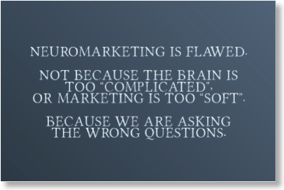The Problem with Neuromarketing
Neuroscience either tells me what I already know, or it tells me something new that I don’t care about”.As criticisms go, it is quite persuasive. It fits with the common view of technology where the shiny new toy replaces the old cruddy way of doing things. But whereas years ago I would have jumped to take on the challenge and “show those !@#$%s”, I increasingly view such statements as something a trap, if (sometimes) a well-intentioned one.

The problem, not always but often, is that it lets someone else define the objective. Now you are solving someone else's problems, rather than what you are actually equipped to solve. Moreover, the problem with “other people’s problems” is that they are often intractable, or where the value of the returns is one-sided.
For example, I’ve had people ask for something like this, “I think our brand efforts are really reaching our target audience, but it’s not showing up in the standard metrics. Do you think you can find something in the brain that would show our effectiveness?"
Lest you think this is just practitioners lacking in scientific knowledge, here’s some from academics. “This type of behavior doesn’t make sense under any of our standard models. Maybe there’s something hardwired in our brains that produce these weird choices?” Or to paraphrase my favorite, Hey, I have this theory, can we test to see whether there’s support for it at the neural level?”
So yes, I think the current state of neuromarketing has many shortcomings, but I thnk the biggest one is that we’ve been letting others define our questions.